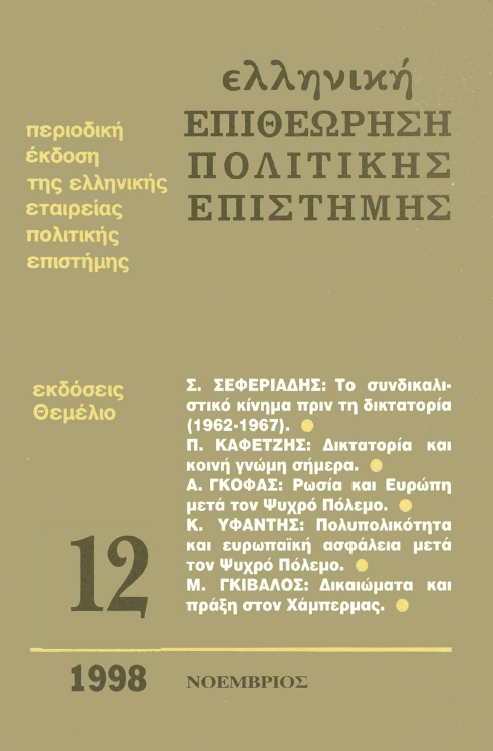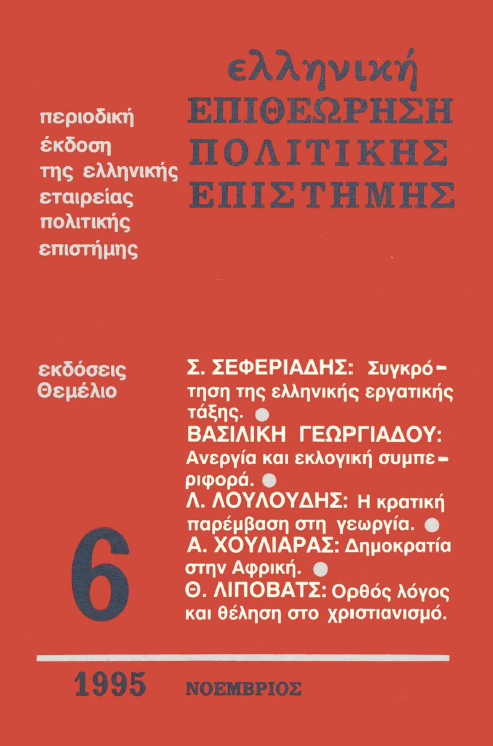Διεκδικητικό Κίνημα και Πολιτική: Ο ελληνικός συνδικαλισμός πριν από τη δικτατορία (1962-1967)
Аннотация
Το κείμενο αυτό στοχεύει διπλά: αφενός, σε μια καταρχάς συγκριτι- κή-θεωρητική διατύπωση των ευρύτερων ιστορικών-δομικών χαρακτηριστικών και της αναπτυξιακής τροχιάς του ελληνικού εργατικού κινήματος και, αφετέρου, στη διερεννηση της συνεισφοράς τον στο κοινωνικό και πολιτικό γίγνεσθαι κατά την κρίσιμη πενταετία πριν από τη δικτατορία. Το άρθρο διατυπώνει τα πρώτα ερευνητικά συμπεράσματα για (α) την εξέλιξη της συνδικαλιστικής αντιπολίτευσης στον εσωτερικό θεσμικό χώρο του κινήματος (β) την αμφίδρομη σχέση που η αντιπολίτευση αυτή είχε με το διεκδικητικό κίνημα και την πολιτική συγκυρία, και (γ) τη σημασία της πολιτικής των εργατικών οργανώσεων καθώς και των πολιτικών κομμάτων με επιρροή στα λαϊκά στρώματα, ως παράγοντα που βοηθά στην ερμηνεία της αδυναμίας του εργατικού κινήματος να προβάλλει ουσιαστική αντίδραση στην επιβολή της δικτατορίας. Το κείμενο τελειώνει με εκτενή βιβλιογραφική αναφορά σε πρόσφατες μελέτες που εννοιολογούν συγκριτικά την επίδραση της δικτατορίας στον ελληνικό συνδικαλισμό.
Article Details
- Как цитировать
-
Σεφεριάδης Σ. (2017). Διεκδικητικό Κίνημα και Πολιτική: Ο ελληνικός συνδικαλισμός πριν από τη δικτατορία (1962-1967). Ελληνική Επιθεώρηση Πολιτικής Επιστήμης, 12, 5–34. https://doi.org/10.12681/hpsa.15125
- Выпуск
- Том 12 (1998)
- Раздел
- Άρθρα

Это произведение доступно по лицензии Creative Commons «Attribution-NonCommercial-ShareAlike» («Атрибуция — Некоммерческое использование — На тех же условиях») 4.0 Всемирная.
Οι συγγραφείς θα πρέπει να είναι σύμφωνοι με τα παρακάτω: Οι συγγραφείς των άρθρων που δημοσιεύονται στο περιοδικό διατηρούν τα δικαιώματα πνευματικής ιδιοκτησίας επί των άρθρων τους, δίνοντας στο περιοδικό το δικαίωμα της πρώτης δημοσίευσης. Άρθρα που δημοσιεύονται στο περιοδικό διατίθενται με άδεια Creative Commons 4.0 και σύμφωνα με την οποία μπορούν να χρησιμοποιούνται ελεύθερα, με αναφορά στο/στη συγγραφέα και στην πρώτη δημοσίευση για μη κερδοσκοπικούς σκοπούς και με δικαίωμα τροποποίησης μόνο με παρόμοια διανομή (αν αναμείξετε, τροποποιήσετε, ή δημιουργήσετε πάνω στο υλικό, πρέπει να διανείμετε τις δικές σας συνεισφορές υπό την ίδια άδεια όπως και το πρωτότυπο).





